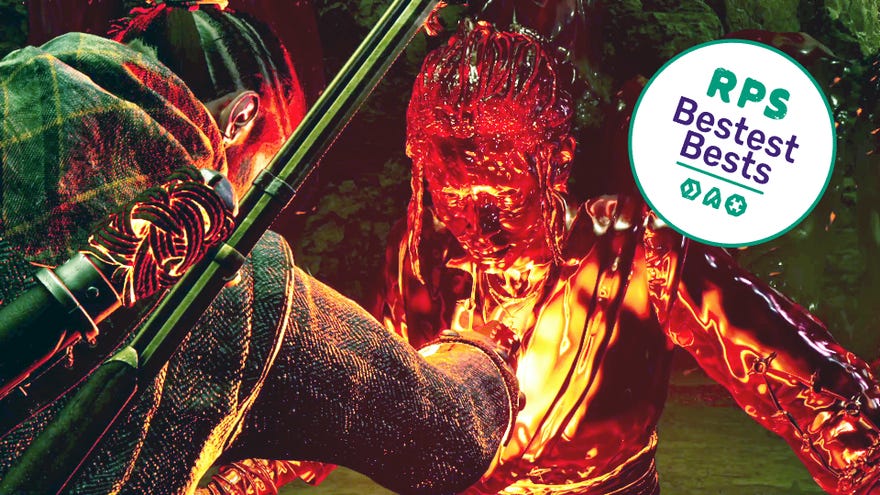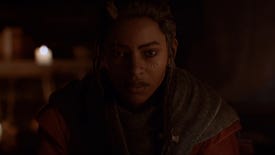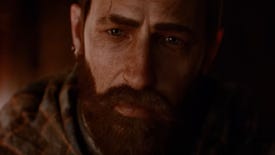Banishers: Ghosts Of New Eden review: an accomplished and emotional action adventure
Reader, I actually cried
"Banishers took a while to kick in," I wrote in the RPS group chat last week, "but I fought a monster made of angry witch-hunting jam last night." It was a pivotal boss fight about half way through Don't Nod's ghost hunting action-adventure RPG Banishers: Ghosts Of New Eden, and typical of the over-the-top, slightly ridiculous, but entirely earnest drama of the game that joyfully pulls you along. Don't Nod - who I am starting to suspect make their magic teen angsthologies to fund their real passion for "grimdark grown-up fantasy that you sort of suspect should be a book series" - have followed up 2018's third-person action effort Vampyr with this new semi-epic.
Banishers has a lot in common with the interwar bloodsucker, including methodical investigations and stacking moral choices, but is a much more accomplished effort. Banishers combines a sweeping, tragic love story with some very decent swashbuckling, shooting possessed skeletons in the face, and being disappointed at Puritans. A perfect game, some may say. I'd elevator-pitch it to you as a sort of goth Uncharted where you find-and-replace "treasure" with "ghosts".
The backdrop for this is, as you might have guessed, New Eden, a fledging settlement somewhere in North America. It's 1695, everyone has a regional accent from the UK or Ireland, and also there is a massive ghost wrecking the gaff. In this alternate universe, with what I consider a pretty great premise, ghosts are observably real, and getting rid of them is a job. Experienced Banisher Antea Duarte, along with her apprentice Red mac Raith (who, in a flagrant HR violation, is also her lover) arrive to deal with the situation, only for Red to immediately walk into an obvious trap and get Antea killed by the very powerful Nightmare ghost. This isn't a spoiler, but the basis of the whole game.
Antea returns as a ghost, and cannot be Banished until they defeat the Nightmare in New Eden, which has corrupted the whole region. Your first main goal is to weaken the Nightmare by solving lesser hauntings in the area. It's a surprisingly large map, too, and we can infer it's in the area that will become new England, as you'll explore a rainy forest, rocky coast, a haunted marsh, open farmland and a snowy mountain. There are caves, dead ends, and shortcuts, and it's all pretty enough that you'll forgive the pop-in on the trees - though not, perhaps, the trekking back and forth as some of the late game descends into the equivalent of ghost-hunting busywork, as you spend five minutes hunting for dill before hauling arse to the other side of the map, dubiously useful weed in hand.
The second goal is to deal with Antea at the end. You can help her Ascend to the afterlife, or resurrect her. Herein lie your moral choices, beloved of Don't Nod. You carefully investigate each haunting case you find, listening to emotional echoes, summoning memories, or the more conventional method of rooting through paperwork. Once you've determined who the ghost is and why they're haunting a local (often named something like Timerity and possessed of one of those silly hats with a belt on) you may either get rid of the ghost, or Blame the living person. The latter kills the person in question, and you have to Blame a majority of living people to ressurect Antea.
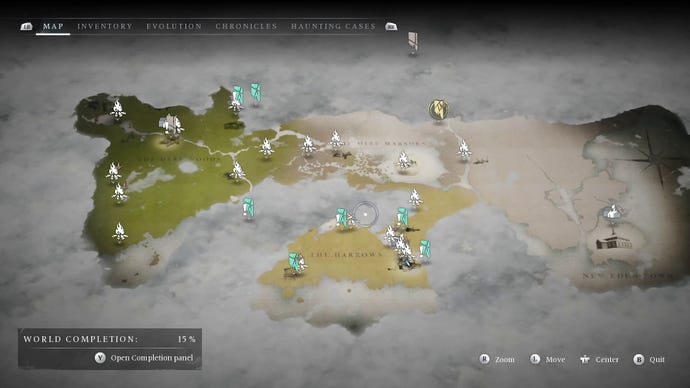
As well as haunting cases, the map is littered with optional activites too: cursed chests, specter nests or elite ghost fights, and trips into the Void where you Banish ghosts. These give you skill point rewards or rare materials to upgrade your gear. Many of these secret areas are gated behind Antea's increasing powers, which she can use to help with traversal or blast away different ghostly impediments.
The choice affects the stacking outcomes for New Eden, which is one of the more gratifying parts of Banishers. Around the town are smaller settlements that people fled to after the Nightmare took over: a hunters' camp in the forest finds itself suddenly expanded, a farming community likewise, and, likewise again, a fort and accompanying mine in the mountains. The more you help these places, the more stable and prosperous they become, and I enjoyed going back to the hunters' camp and see it turn into an actual village. But as is infinitely predictable with this sort of moral choice game, the most obvious rat-bastards will often be the most useful to a community - the odious racist is the hunter that supplies the fort with meat, that sort of thing - while those you could safely bad-murder without consequence are likely to be loving cottagecore lesbians.
It doesn't affect your levelling, though. Each haunting successfully closed will provide Antea with the same amount of ghost points to put into her combat abilities. Red and Antea fight together, with Antea being more effective against ghosts who have possessed a body, and Red slanging a fiery torch and sword against the more ethereal specter form. They have separate gear and skills, but it's all very malleable. You get an either/or pick of skills from all the branches of the tree, but can swap them whenever you want. I picked one that means every fourth hit Red lands is accompanied by a punch from Antea, which is brilliant, but there are Devil's bargain types that increase Red's damage at the loss of his health, and things like that. Many interlock, too. There's one that gives Red a health boost whenever Antea defeats a specter, for example. It's a lovely extension of their character dynamic, while allowing you some of your own latitude.
Antea has AOE and powerful crowd control special abilities, but her mana and health bars are essentially just the same thing, because she's already dead. Use her a lot and you'll deplete her energy, which you recharge by landing sword attacks as Red. It works because you can switch between Antea and Red pretty instantly at the press of a button. The speed means you can achieve flow states where Antea blasts a bunch of ghost wolves to pieces, you swap to Red to parry a heavy attack from a tanky blob specter, swap back to Antea to tangle it in ghost vines, and then flick back to Red to shoot a ranged-attack ghost in the head. The longer you play the more enjoyable it gets, and it's not so much a step up from Vampyr's clumsy action as it is an entire staircase - though if you're after a challenge, the gestures Banishers makes towards a Soulslike, with things like Red's limited health flask, don't really provide one.
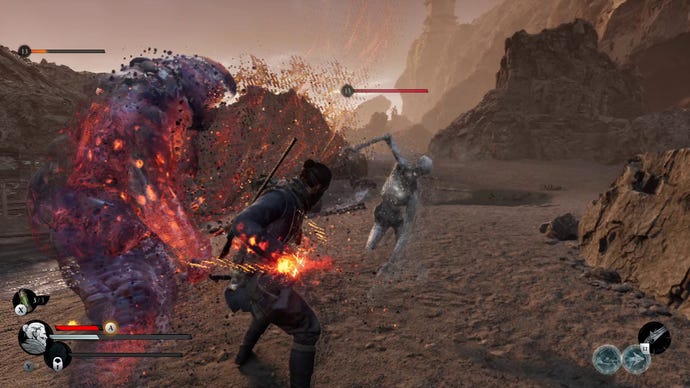
What warmed me more to the game, and what kept me hanging around for 40-odd hours when I could probably have sprinted through in 20, was the story - Red and Antea's partnership, and the cases they dealt with. The Nightmare in New Eden was born from a woman betrayed by the whole community, and her fate is tangled up in each of the outposts, where you have a landmark boss fight - moments of high drama that could be in danger of seeming a Bit Much. But orbiting around that are all the little stories, and while they're not all winners, some of the hauntings are inventive and touching. One woman is haunted by her future self, sent back in time by the weight of her regret. Another lingers after her death because she wants to continue her work as a nurse. The theme is promises, broken and kept, which is of course the theme of Antea and Red's story, too.
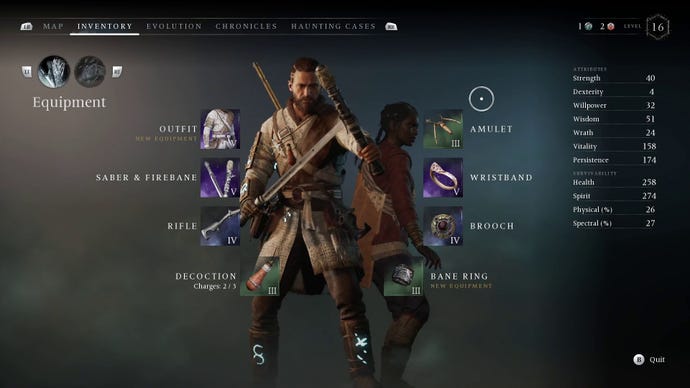
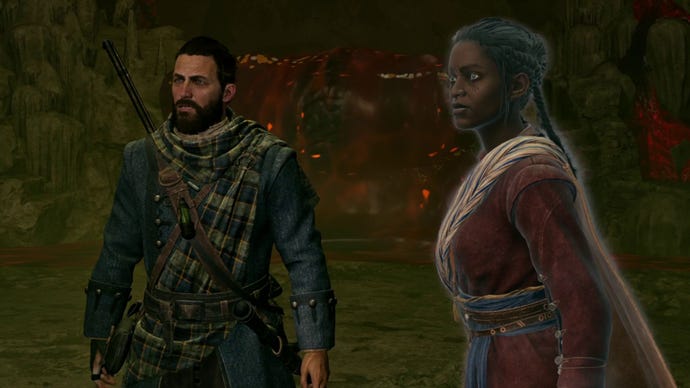
As you get closer to the final resolution, you learn more about Red and Antea's relationship. Their history, both together and separately in Scotland and Cuba, is referenced but never heavily exposited (even the lore of the game is light on exposition, for which I was grateful), and it seems they learn more about each other even as they grapple with the fact that one of them has died. The two excellent leads, Amaka Okafor and Russ Bain, ground the entire game, providing a very human anchor in those moments that would otherwise seem potentially a bit silly. You commit to the choice of what to do about Antea very early on, before you properly know either of them, and Red's quiet but growing anguish made me wish I could change my mind. That's probably the point, isn't it? Maybe it's because I'm having a week, but I cried at the end, and I have literally never cried at a video game before.
The annoyances, such as they are, will weigh heavy on some people, and the invitation to care earnestly, and to enjoy a story that is unironically about the power of love, will be anathema to others. But gosh, it's a nice game - an oasis of solid single player story in a dry season of live service - and the biggest step forward in this particular direction that Don't Nod have taken for years. I'm hoping the colon in the title might mean more banishings to come.
